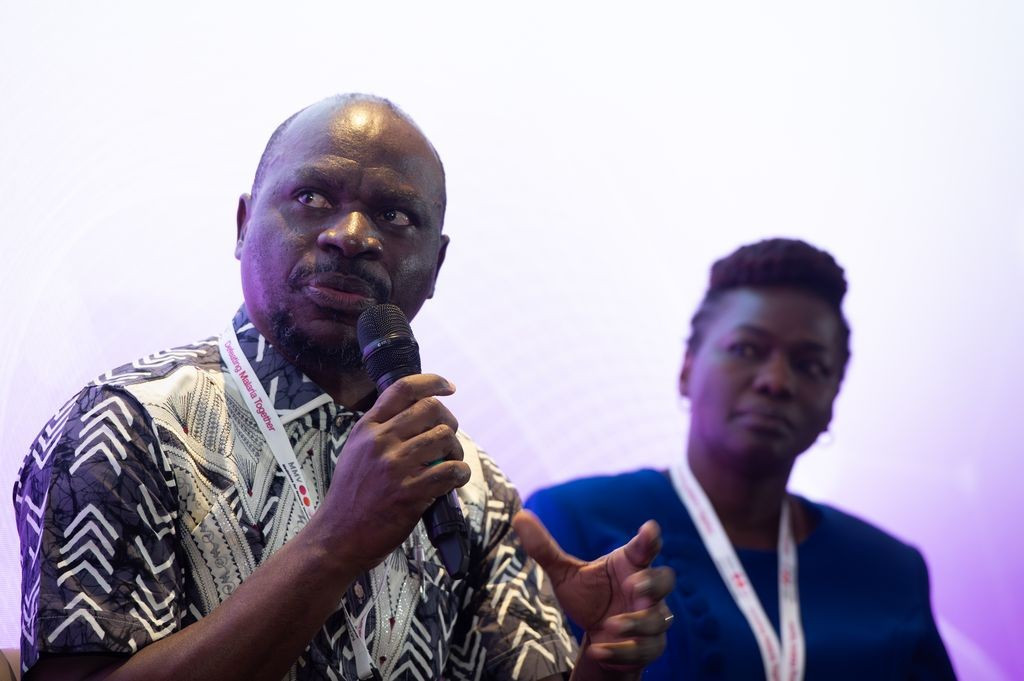ASTMH Annual Meeting 2025
blogClinical Trial in Africa Finds Single-Dose Malaria Treatment Combining Four Existing Drugs as Effective as More Onerous Multi-Day, Multi-Dose Regimen
By: Matthew Davis, Burness

Hundreds of malaria patients participating in a Phase 3 clinical trial in Gabon in West Africa were cured via a single dose of a treatment that utilizes four widely available malaria drugs, according to a new study presented Wednesday at #TropMed25.
The advance addresses a pair of problems that have contributed to a stalled fight against a disease that each year kills about 600,000 people: the alarming rise of drug-resistant malaria and the fact that a third or more of malaria patients fail to complete the standard three-day course of treatment, which can both encourage drug resistance and allow curable cases to intensify.
“We found that our single-dose treatment was just as effective as the standard course that typically requires taking six doses spaced out over three days, which many patients never complete,” said Ghyslain Mombo-Ngoma, MD, PhD, lead author of the study and head of clinical operations at the Medical Research Center of Lambaréné, Gabon (known by its French acronym CERMEL).
He noted the single-dose treatment combining sulfadoxine, pyrimethamine, artesunate and pyronaridine (SPAP) may be more effective against drug-resistant parasites than standard therapies because the novel combination of four medicines — versus two drugs typically used in conventional treatments — targets four different vulnerabilities in the malaria parasite. Mombo-Ngoma said forcing a pathogen to fight a multi-front battle has been used to counter drug-resistant tuberculosis and is of growing interest to malaria experts.
Meanwhile, he said a single-dose option for treating malaria addresses the problem of resistance emerging in patients that don’t complete their full course of medicines — while also curing cases that, if insufficiently medicated, can allow malaria to persist and potentially cause life-threatening complications.
There is an urgent need for new ways to treat malaria patients because in sub-Saharan Africa, which accounts for 95% of the world’s malaria infections and deaths, the fight against the disease has hit a plateau. After falling dramatically from 2000 to 2015, malaria infections and deaths, which mainly occur in children under 5 years old, have increased. The most recent figures available from the World Health Organization show that in 2023, there were 263 million cases and 597,000 deaths, compared with 2016 levels of 216 million cases and 445,000 deaths.
Along with funding threats, a key impediment to rejuvenating the fight against malaria is that parasites are developing at least partial resistance to treatments that combine artemisinin-based malaria drugs (once hailed as a major breakthrough against malaria) with one other medicine.
“Another challenge is that artemisinin combination therapies (ACTs) must be taken for three days to clear parasites from infected patients, and a third or more of malaria patients don’t complete the full course,” Mombo-Ngoma said. He said this failure can allow a large number of parasites to linger in the body, posing the risk that they could continue to multiply and cause severe disease, while also giving them time to develop mutations that can overcome ACTs.
The evidence supporting a single-dose cure that could at least reduce the threat of drug resistance is arriving at a time of encouraging progress in developing new compounds capable of defeating drug-resistant parasites. Mombo-Ngoma noted that while there is hope on the horizon, even in a best-case scenario, it will still take several years for the most advanced of these compounds to become widely available in Africa.
“I’m a malaria researcher, but I’m also a doctor treating a lot of malaria patients, and I need new options now,” he said. “What I hope is that, if we continue to have success with this single-dose cure, it can serve as a bridge to the new treatments now under development — something we can deploy very soon while we await the arrival of other options.”
Related Posts
By: Matthew Davis, Burness
By: Matthew Davis, Burness